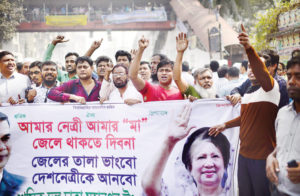Prosecution of big party leaders not a way to win election

Faruque Ahmed 19/2/2018
Rule of law and arrogance of power can’t go together, one just cancels out the other. The government has announced parliamentary election; this is good when it comes about allowing the people to elect the representative of their choice.
But the imprisonment of the major opposition leader Begum Khaleda Zia on February 8 on whatever the grounds and indiscriminate arrest and torture of the opposition party men are not good at supporting election politics. It is poised to undermine the very possibility of an inclusive election to raise questions on government motives.
Full Story
Faruque Ahmed
Rule of law and arrogance of power can’t go together, one just cancels out the other. The government has announced parliamentary election; this is good when it comes about allowing the people to elect the representative of their choice.
But the imprisonment of the major opposition leader Begum Khaleda Zia on February 8 on whatever the grounds and indiscriminate arrest and torture of the opposition party men are not good at supporting election politics. It is poised to undermine the very possibility of an inclusive election to raise questions on government motives.
The motive is not much hidden either. The government appears not ready to relate elections with Begum Zia’s conviction. When the government leaders say election will not wait for Begum Zia or her release, they make the case clear.
Law Minister Anisul Haq was candid when he said he apprehends whether Begum Zia would be able to take part in the next election. But why they created the situation has no direct answer. It hears highly disturbing when Anti-corruption Commission (ACC) lawyers say they would oppose petition at the High Court seeking bail for Begum Zia or exempting her imprisonment.
Moreover when they say they would ask the court to double her jail term they seem to be highly invective crossing all limit of decency in a democratic polity. Victory processions by ruling party leaders were also equally reprehensive. Almost every people know she is victim of dirty politics.
But it surely unveils the government plans to book the BNP chairperson in as many criminal cases so that she can’t qualify for election. The government has denied allegations that it has influenced the court. But party leaders’ rhetoric suggests it otherwise.
Here the bigger question is: Begum Zia is not an individual; but the government by ignoring her popularity as the leader of the biggest opposition party is ignoring the sentiment of the masses. Many believe it is a mindless insult to the people. One can’t ignore the fact that people have elected her Prime Minister for three times and she has every potential to lead the nation again in free and fair election.
Her call for boycott of election in 2014 in absence of an election environment left the ruling party Awami League to face the critical situation to hold virtually a one party election in which 153 MPs were elected uncontested in absence of opposition candidate.
Elections to other constituencies were similarly held in name shake manner. Rivals were forced to shut and withdraw to make election of Awami League candidates absolute. Only Jatiya Party (Ershad) was accepted as a friendly opposition in parliament with few seats simultaneously acting as coalition partner of the government.
The imprisonment of Begum Zia made similar prospect of an election without the major opposition this time again as most political observers believe BNP and its 20-party alliance may boycott the polls. BNP leaders made it clear they will not take part in election without Begum Zia on whatever grounds the government wants to disqualify her from the race.
BNP leaders say they want election but they equally want Begum Zia to lead the opposition to election. The government leaders say whether or not she will be able to contest election is a legal matter but the government will be at zero tolerance to thwart any movement seeking the release of Begum Zia.
She has a total of 34 cases now against her that include 20 at the stage of hearing for framing of charges. Trials in 11 cases that include one for treason and 10 as the mastermind behind subversive activities during last election remained suspended on High Court order. Indications are there that the government is going to prompt their hearing.
Media report said when Begum Zia’s lawyers were preparing for filing bail petition in Zia Orphanage case, which they claim as a concocted case, the government lawyers are lining more cases for hearing and planned to oppose bail. Four cases are due for hearing in February and early March. Police have also shown her arrest in some other cases, although Home Minister Asaduzzaman Khan categorically denied it on Tuesday.
The room for consensus with BNP for an inclusive election has suddenly disappeared. The situation shows the government is purportedly pushing BNP on the edge.
Meanwhile, the ruling party has already started election campaign at different level keeping the opposition BNP busy in legal battles even by manipulating thousands of old and new cases against BNP leaders and workers at national level and grassroots.
Prime Minister herself is seeking votes while launching new projects when her rival BNP chairperson is languishing in jail.
On the day Begum Zia landed in jail, the Prime Minister lashed out at her poising a question “where is Khaleda” in a public meeting in Barisal. Contrary to it, Begum Zia told distressed relatives and party men they must keep patience and wait; she will come back.
The rhetoric from both leaders landed as symbolic of different situation on both camps. The Prime Minister is undaunted while the opposition leader is unbeatable in her resolve. It appears BNP has taken a new strategy now to avoid bloody street confrontation in favor of peaceful movement riding on sympathy of the people on Begum Zia’s imprisonment.
She also left similar instruction to party men before going to jail and there is no doubt it looks like a major turning point in BNP politics. Party men believe her imprisonment will prove big blunder for the government.
Prior to verdict in the orphanage case, police ran indiscriminate arrest of BNP leaders and workers throughout the country and particularly in the capital. Law enforcers even restricted arrival of party men to the capital. City entry points were guarded and yet party men showed heavy presence in the capital to protest.
But they refrained from engaging with heavily mobilized ruling party cadres waiting to take on the opposition. It could have been a bloody occasion but BNP men exercised restraint picking nationwide praise.
Some newspapers ran provocative stories saying Awami League had easily overcome the ordeal to suggest BNP men did not dare to engage. But party secretary general Mirza Fakhrul Islam however said none should take it weakness of the party; they have carefully avoided unequal fight with ruling party men under police protection. They had saved their strength.
The new policy now seeks to create a people’s platform with 20-pqrty alliance and other parties beyond the alliance. It highlights the party’s new politics calling for national unity and to set up a ‘Combined Opposition’ for movement for restoration of democracy and prepare for national election. It wants to mobilize people to foil the ruling party’s plan to continue in power using a name shake election.
The platform may include 8 leftist parties staying outside the government, Nagorik Oikya and a big part of the Jatiya Party and some Islamist parties. They will not initially raise voice for release of Begum Zia but run simultaneous movement for an inclusive election under an election time caretaker government.
Communist Party president Mujahidul Islam Salim said when the government leaders say none is above law to justify imprisonment of Begum Zia, they are right. But the onus now lies on the government to prove it with opening cases against hundreds of ruling party men who have stolen thousands of crore taka from state owned banks.
If five years jail is justified for an alleged graft involving $250,000, how many long years party men deserve for laundering big banks is the big question.









